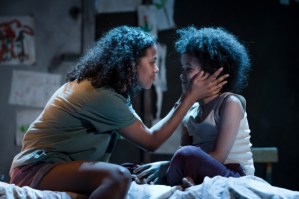Review: Room (Theatre Royal Stratford East)
Emma Donoghue’s novel about a woman kept in the same room for seven years gets its stage premiere
Room‘s impact should be in its reveal. At the start, a mother and son potter around their small studio flat: breakfast-time, bath-time, play-time and bed. Nothing out of the ordinary, save for the odd oddity. They exercise indoors, for instance, and stare up at the skylight. Every so often, they hold screaming sessions. Their home has no windows and a thick metal door, and they never seem to leave.
Emma Donoghue’s best-selling novel keeps its secrets. It’s told from the perspective of five-year old Jack, who simply says what he sees, knowing no different and no better. This is his reality, and he can’t understand its every implication. Gradually, for the reader, the penny drops: Jack and his Ma are captives. She’s been locked up for the last seven years, and her son has never known anything else. This routine is his normal; this room – not a room, but 'Room' – is his world. He’s never known weather or fresh air, never met anyone else. Television channels are entire other planets. At night, Old Nick unlocks the door, restocks their supplies and rapes his mother.
Off the page, that reveal is reduced. Marketing tends to get there first and, just as its trailer contained spoilers, the film’s success scuppers the stage version. The stage simply can’t hold things back. It can’t limit our perspective like the pen or the camera. The metal door’s on show from the off, the overhead skylight the sole source of light. Donoghue’s own adaptation attempts to keep the child's-eye view – an adult actor, Fela Lufadeju, watches on and narrates Jack’s version of events – but it fatally misjudges both structure and tone. Cora Bissett’s production stirs songs into the mix and only makes matters worse.
The effect is to turn serious trauma into simplistic fable – one that does a major injustice to every real-life case it resembles. Neither script nor staging come close to conveying the horror of Ma’s reality, and once the pair manage to escape, the narrative becomes overly episodic. Witney White has no space to examine the chronic effects of serial rape and abuse, nor can Harrison Wilding (playing Little Jack on opening night) begin to convey the catatonia of having every certainty overturned in one go. He looks more like a cute, confused Cabbage Patch Doll than a child raised in complete isolation.
The problem, really, is that Room tells us a story rather than showing us a life and, in doing so, it puts Donoghue’s allegory ahead of its reality. That’s wrongheaded. This is too stark a situation to handle so lightly, as if abduction and serial rape might be treated metaphorically.
It’s not that Donoghue’s story doesn’t resonate as such, but it needs playing straight to have any power. Room is Plato’s Cave made real, and Ma’s situation stands as a symbol of all patriarchal oppression, anywhere women are confined to chores, childrearing and sex. Onstage, in particular, its theatricality comes to the fore – be that the flights of fancy Ma and Jack play out or the constructed set they accept as their reality. Bissett implies that the whole world’s just as unreal, and all its consumer choices are empty. Lily Arnold’s design contrasts the love in their long-term living quarters, drawings blu-tacked all over, with the bland sterility of modish furnishings and mod-cons outside. Her wire-frame houses suggest neither environment is more real than the other. That artifice makes Room ripe for theatrical adaptation, but to work, the stage must honour its reality.
Room runs at the Theatre Royal Stratford East until 3 June, then tours to Dundee Rep (13 to 17 June) and Abbey Theatre, Dublin (24 June to 22 July).













